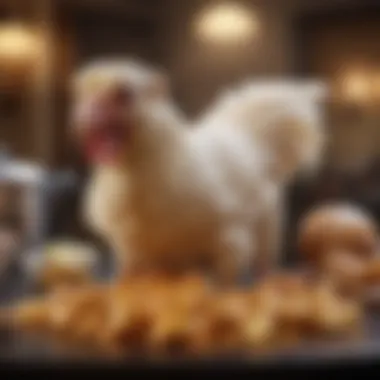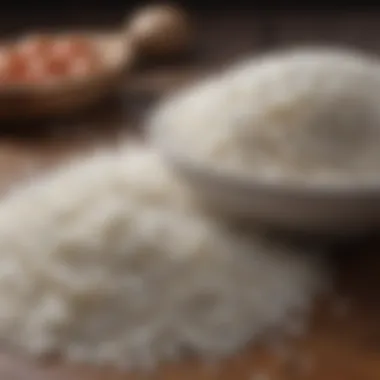Effective Foods to Combat Diarrhea in Dogs


Intro
Caring for a dog involves understanding its health needs and behavior. One common issue that many pet owners face is diarrhea, which can be distressing for both the dog and its owner. Addressing this problem requires not only veterinary input but also a careful approach to diet. This article dives into effective foods that can aid in managing diarrhea in dogs, offering pet owners the information they need for a better recovery process.
Understanding Your Pet
When dealing with dietary choices for diarrhea, it is essential to consider your dog's unique traits. Dogs differ in breed traits, temperaments, and special needs that can affect their dietary requirements.
Breed Traits
Understanding breed-specific characteristics is important when determining the right diet for your dog. Some breeds may have more sensitive stomachs or dietary restrictions. Researching your dog's breed can provide insight into potential health issues, making it easier to choose appropriate foods that will aid in recovery from diarrhea.
Common Temperaments
Temperament can influence how a dog reacts to different foods. A more anxious dog may not respond well to sudden changes in diet, potentially leading to further digestive issues. Observing your dog's preferences and behaviors related to food can help tailor an effective diet plan.
Special Needs
Some dogs have unique health considerations, such as allergies or other digestive problems. Consulting with a veterinarian can help identify these special needs. A proper diagnosis ensures that any dietary changes support your dog's overall health, especially when recovering from diarrhea.
Nutrition and Feeding Guidelines
Choosing the right foods is critical to ensure recovery and proper nutrition during this challenging time. Certain foods can provide beneficial nutrients while also being gentle on your dog’s digestive system.
- Boiled White Rice: Often recommended as a staple food for diarrhea; it is easy on the stomach and helps firm up stools.
- Plain, Boiled Chicken: Skinless and boneless chicken adds protein without heavy fats. It's digestible and can help provide energy.
- Pumpkin: Canned or cooked pumpkin is a great source of fiber and can help balance out digestive problems.
- Probiotics: Supplements can help restore balance to the gut flora, enhancing recovery chances.
- Sweet Potatoes: Another fiber-rich option that is gentle on the digestive system.
Many of these foods can be mixed or served separately to ensure variety and maintain your dog's interest in eating.
Implementing Foods into the Diet
Introducing these foods into your dog's diet should be gradual. Sudden changes can upset the stomach further. Start with small amounts and monitor your dog's digestive response.
In cases of prolonged diarrhea, consult your veterinarian to rule out underlying issues.
Gradually increase the serving as your dog stabilizes. It is also important to stay hydrated, so ensure your dog has access to plenty of fresh water.
Closure
Diarrhea in dogs is not uncommon, but it can be troubling for pet owners. Understanding your dog's needs, coupled with judicious dietary choices, can aid in recovery. Proper nutrition, combined with professional guidance, helps ensure your pet's health is safeguarded during this time. As any caring pet owner knows, keeping informed is vital for effective care.
Understanding Diarrhea in Dogs
Understanding diarrhea in dogs is crucial for any pet owner. Not only does it affect their comfort and health, but it can also signal underlying issues that might require attention. Knowing what diarrhea is and its implications helps owners make informed decisions about their dog's care. This section aims to clarify these points.
What is Diarrhea?
Diarrhea in dogs is characterized by the frequent passage of loose or watery stools. This condition can lead to significant discomfort for your pet and may result in dehydration if not managed properly. Diarrhea can be acute, meaning it lasts for a short duration, or chronic, lasting longer than two weeks. Identifying the type is important for treatment and management.
Common signs of diarrhea include increased bowel movements, straining while defecating, and possibly blood in the stool. Each of these symptoms can guide you in understanding the severity of the condition. Recognizing these signs early on can be beneficial in deciding when to act, whether that means adjusting the dog's diet or consulting with a veterinarian.
Common Causes of Diarrhea in Dogs
Dogs may experience diarrhea for various reasons. Understanding these causes is essential for prevention and treatment. Common causes include:
- Dietary indiscretion: Eating something that doesn’t agree with them, like spoiled food or human food.
- Infections: Bacterial, viral, or parasitic infections can disrupt the digestive system.
- Allergies: Some dogs have food sensitivities that lead to gastrointestinal upset.
- Medications: Certain medications may have diarrhea as a side effect.
- Stress: Changes in environment, like moving to a new home or the addition of a new pet, can lead to stress-induced diarrhea.
By noting what might have triggered this change in your dog, you can assist a veterinarian in making accurate assessments when seeking help.
When to Consult a Veterinarian


Consulting a veterinarian promptly can be vital, especially if the symptoms are severe or persist. You should consider contacting a veterinarian if:
- Diarrhea lasts longer than 24-48 hours: Prolonged diarrhea may cause significant dehydration.
- There are additional symptoms: Vomiting, lethargy, or signs of pain may indicate a more serious condition.
- Blood is present in the stool: Blood can signal infections or internal injuries.
- The dog is very young, elderly, or has pre-existing health issues: These cases are at a higher risk for complications.
As a general guideline, if you are uncertain about your dog’s wellbeing, it is always better to err on the side of caution and seek professional advice.
Ultimately, prompt veterinary intervention in cases of persistent diarrhea can lead to better outcomes for your pet.
Nutritional Considerations for Diarrhea Management
When a dog experiences diarrhea, proper nutrition becomes a vital aspect of their recovery. A thoughtful approach to dietary choices can help alleviate symptoms and restore digestive health. This section delves into the nutritional components that play a significant role in managing diarrhea in dogs, including essential nutrients and hydration.
Understanding Nutritional Needs
Nutritional needs for dogs can vary based on numerous factors, including age, size, and underlying health conditions. During bouts of diarrhea, it is crucial to adjust the dog's diet to ease their gastrointestinal distress. A bland diet is typically recommended.
Key nutrients like proteins, carbohydrates, and fats should be monitored closely. For instance, simple carbohydrates from white rice and lean protein from boiled chicken can provide easily digestible options. These foods offer energy without putting added stress on the digestive system.
Moreover, dogs require certain vitamins and minerals for overall health. A deficiency can worsen health issues. Therefore, while focusing on immediate dietary adjustments, it is crucial to keep a balanced intake in mind.
The Role of Hydration
Hydration is often overlooked but is paramount when addressing diarrhea in dogs. Frequent fluid loss can lead to dehydration, which can be serious and life-threatening. It is important to ensure that your dog has continuous access to clean, fresh water.
In cases of diarrhea, plain broth or electrolyte solutions made specifically for pets can also help maintain hydration levels. Additionally, offering water-rich foods, like pureed pumpkin, may support overall fluid intake.
Ensuring proper hydration is essential to prevent dehydration during episodes of diarrhea. Consider offering rehydration solutions alongside regular water.
In summary, managing diarrhea in dogs through nutritional considerations is paramount. Understanding their needs and emphasizing hydration can significantly impact their recovery and well-being.
Recommended Foods for Dogs with Diarrhea
Choosing the right foods when a dog has diarrhea is critical. It can make a significant difference in the recovery process. The appropriate diet not only helps in easing the digestive tract but also ensures that the dog receives the essential nutrients needed to maintain health during this stressful time.
In this section, we delve into several recommended food options that can aid in the management of diarrhea in dogs. The key is to select foods that are gentle on the stomach and can provide better hydration and nutrients without overwhelming the system.
Bland Diets: An Overview
A bland diet is often the first line of defense when dealing with diarrhea in dogs. Such diets are generally low in fat and fiber while being easy to digest. The goal is to minimize digestive distress and allow the intestinal lining to heal without the burden of harsh ingredients. Common properties include:
- Low fat content, which eases the workload on the digestive system.
- High digestibility, promoting faster recovery.
- Simple ingredients to avoid food sensitivities.
Implementing a bland diet can alleviate symptoms while maintaining nutrition, so it is crucial for dog owners to consider this approach first.
Boiled Chicken and Rice
Boiled chicken and rice is a classic choice for dogs suffering from diarrhea. Skinless chicken breast provides lean protein, while white rice serves as a source of easily digestible carbohydrates. Some important points include:
- Protein Source: Chicken is flavorful and contains no skin or bones, making it easier to digest.
- Carbohydrate Support: Rice can help firm up the stool and provide energy.
- Easy Preparation: Simply boil chicken and cook rice, mix together, and serve. This simplicity allows for quick preparation, which is often needed in urgent situations.
This combination can be fed to dogs until their stool returns to normal, after which other foods can slowly be reintroduced.
Pumpkin as a Dietary Addition
Pumpkin is another excellent addition to a dog’s diet during diarrhea episodes. It is a natural source of fiber that helps in both diarrhea and constipation. Some points to be aware of:
- Fiber Benefits: The soluble fiber in pumpkin helps absorb excess water in the digestive tract, which can help firm up loose stools.
- Nutrient Dense: It contains important vitamins and minerals such as vitamin A, potassium, and iron.
- Versatility: Pumpkin can be mixed with other dog-safe bland foods like boiled chicken or rice to enhance palatability.
Including pumpkin in a dog’s diet during digestive upset can significantly aid in their recovery process.


Plain Yogurt: A Probiotic Option
Plain yogurt can serve as a probiotic option that helps to restore healthy gut bacteria. Many dog owners may find this surprising, but natural, unsweetened yogurt with live cultures can be beneficial. Here are some reasons:
- Probiotic Properties: Yogurt contains cultures that can help balance gut microflora.
- Digestive Health: It can promote a healthier digestive system, which is crucial during recovery.
- Moderation is Key: It's essential to provide in small amounts to prevent any further upset since some dogs can be lactose intolerant.
Incorporating plain yogurt can support the digestive process in dogs recovering from diarrhea.
White Fish and Sweet Potatoes
White fish, such as cod or haddock, combined with sweet potatoes also makes for a nutritious meal option. This combination is gentle on the stomach and provides beneficial nutrients:
- High Quality Protein: Fish offers lean protein and omega-3 fatty acids, which can have anti-inflammatory properties.
- Carbohydrate Alternative: Sweet potatoes are rich in vitamins and provide a good source of dietary fiber.
- Easy to Prepare: Both ingredients can be steamed or boiled simply, making them convenient to serve.
These attributes make this combination suitable for dogs needing a gentle approach to aid their recovery.
Commercial Prescription Diets
For cases where diarrhea is persistent or severe, commercial prescription diets can be an option. These diets are formulated specifically to support recovery:
- Veterinary Approval: Formulated by veterinarians to ensure optimal nutrition and digestive support.
- Variety Available: Options are available in both wet and dry forms catering to different dietary needs.
- Professional Guidance Necessary: It's recommended to consult a veterinarian before introducing these diets to ensure they meet specific health needs.
These diets offer a structured and professional approach in serious cases of diarrhea, helping ensure that the dog receives the nutrients it needs to recover.
Overall, focusing on suitable diets can greatly aid in managing a dog’s diarrhea. It is vital to make informed choices based on the specific needs of the pet.
Foods to Avoid During Diarrhea
When a dog is experiencing diarrhea, the choice of food becomes crucial. Consuming the wrong types of food can exacerbate the condition and prolong recovery. Understanding which foods to avoid will aid in a swift resolution of digestive issues while maintaining overall health. This section categorizes specific food types that should be eliminated during diarrheal episodes and provides insight into why these choices are detrimental to your dog.
Fatty Foods
Fatty foods can be particularly harsh on a dog's digestive system, especially when it is already compromised by diarrhea. Foods like fried snacks, fatty cuts of meat, and certain oils can lead to further inflammation of the gastrointestinal tract. High-fat content can cause increased bile secretion and may not be adequately processed during episodes of diarrhea, which can aggravate symptoms.
In addition, consuming fatty foods may result in pancreatitis, a serious condition characterized by inflammation of the pancreas. Symptoms include severe abdominal pain and vomiting, which can complicate recovery from diarrhea. It is advisable to stick to lean proteins and low-fat options when your dog is unwell.
Dairy Products Other Than Yogurt
Dogs can sometimes tolerate plain yogurt due to its probiotic content, but most other dairy products should be avoided during episodes of diarrhea. Cheese, milk, and cream can disrupt the digestive system for many dogs, leading to increased gas and bloating. This is especially true for dogs that may be lactose intolerant, as they may not produce enough lactase, the enzyme needed to digest lactose effectively.
Eliminating these dairy products helps reduce the chance of further gastrointestinal upset. Dogs that are already suffering from diarrhea do not need additional complications like further digestive discomfort. Yogurt remains a safe option, but others should be strictly avoided during recovery.
Certain Vegetables and Fruits
Some vegetables and fruits can irritate a dog's digestive system, particularly when it is already inflamed. For instance, onions, garlic, and avocados contain compounds that can be highly toxic or disruptive. These foods can lead to gastrointestinal distress, which can worsen existing diarrhea.
Additionally, while fruits like grapes and raisins pose a risk regardless, many dogs may also react poorly to high-fiber vegetables such as broccoli and cabbage during digestive inflammation. These can lead to increased gas, cramping, and discomfort. Instead, it is better to focus on digestion-friendly options like boiled carrots or zucchini, which can be gentler on the stomach.
Avoiding these specific food categories is essential for the swift recovery of your dog's digestive health.
In summary, monitoring and modifying your dog's diet is key during bouts of diarrhea. Removing fatty foods, most dairy products, and certain vegetables and fruits will help create an environment for healing and ultimately improve your dog's well-being.
Implementing Dietary Changes
Implementing dietary changes is a critical step when addressing diarrhea in dogs. Adjusting your dog's food intake not only aids in recovery but also helps prevent recurrence of digestive issues. It's essential to approach this transition thoughtfully. Rapid changes can lead to additional stomach upset. Understanding how to introduce and adapt new foods to your dog’s diet can have several benefits, including improved digestion and enhanced overall health.
Gradual Intro of New Foods
When your dog experiences diarrhea, it is important to slowly introduce new foods. This gradual approach can help the digestive system adjust and minimize the risk of further irritation. Start by mixing small amounts of new, bland foods, like boiled chicken or rice, into your dog’s regular diet. This blending should occur over a period of three to five days.


What you should do:
- Start Small: Begin with a ratio of about 75% old food to 25% new food.
- Increase Gradually: Over several days, increase the proportion of the new food.
- Observe: Pay attention to your dog’s stool consistency and general behavior. If diarrhea persists, consider reverting to the old food temporarily.
Monitoring Your Dog's Response
Monitoring is a vital process in dietary transitions. This involves closely observing your dog’s reactions to new foods. After you introduce new items, watch for signs of digestive distress, which may include continuing diarrhea or vomiting. Keeping a daily log can help you track changes in stool quality, appetite, and energy levels.
Helpful tips include:
- Daily Check-Ins: Evaluate frequency and consistency of bowel movements.
- Behavior Observations: Note any changes in appetite or activity levels.
- Veterinary Consultation: If you observe concerning symptoms, it is wise to consult your veterinarian for recommendations.
Adjusting Feeding Frequency
Adjusting how often you feed your dog can also support their recovery during diarrhea. Smaller, more frequent meals often digest better than large meals. This approach can help alleviate the pressure on the digestive system and can improve nutrient absorption. Consider dividing your dog's daily food intake into three or four smaller portions.
Key points to consider:
- Meal Size: Make sure each meal is proportionate to their size and health condition.
- Consistency: Try to maintain regular feeding times each day to help the dog's routine.
- Hydration: Keep fresh water available at all times, as diarrhea can lead to dehydration.
"Small changes in a dog's diet can lead to big improvements in health, especially when dealing with digestive issues."
In summary, implementing dietary changes requires careful consideration. The process should involve gradually introducing new foods, meticulously monitoring your dog's response, and adjusting the feeding frequency as needed. These steps are essential for promoting recovery and restoring digestive health.
Considerations for Long-Term Health
When dealing with diarrhea in dogs, understanding the long-term health implications is crucial. Dogs may experience episodes of diarrhea due to various dietary indiscretions or health issues. However, repeated incidents may indicate something more significant that could affect your dog’s overall well-being.
Identifying Underlying Issues
Identifying underlying health issues is essential for your dog’s long-term health. Diarrhea can sometimes be a symptom of more serious problems such as food allergies, infections, or gastrointestinal diseases. If your dog experiences recurring diarrhea, it should not be taken lightly.
To address this, consider the following steps:
- Veterinary Consultation: It is vital to consult with your veterinarian. They can perform diagnostic tests and give you a clear understanding of your dog's health status.
- Keep a Journal: Document your dog's diet, behavior, and any other symptoms. This record can assist your vet in identifying patterns that may reveal an underlying condition.
- Monitor Changes: Notice if diarrhea correlates with specific foods or environmental changes. It may indicate food intolerance or allergies, leading to a chronic condition.
By identifying and addressing these underlying issues early, you can ensure a healthier, happier life for your dog.
Importance of a Balanced Diet
Maintaining a balanced diet is vital for your dog's long-term health. A proper diet contributes not just to digestion but also to your dog's immune system and overall body functions. Here's why this aspect is crucial:
- Nutritional Needs: Dogs require a balanced mix of proteins, fats, carbohydrates, vitamins, and minerals. A well-rounded diet aids in proper digestion and metabolic processes.
- Prevent Tummy Upsets: Consistency in diet and avoiding sudden changes can help prevent gastrointestinal disturbances. A balanced diet helps strengthen the digestive system, minimizing the risk of diarrhea episodes in the future.
- Weight Management: Maintaining a healthy weight is important to prevent obesity-related issues. A balanced diet promotes a healthy body condition, reducing strain on internal organs and joints.
To ensure a balanced diet:
- Include a variety of foods that cater to your dog’s age, breed, and health condition.
- Consider high-quality commercial dog foods or consult with a pet nutritionist about home-cooked meals.
In addressing these considerations for long-term health, you help foster a more resilient and healthier canine companion.
Remember: Regular check-ups with your vet and a keen eye on your dog’s diet can save you from long-term health problems.
Ending
In this article, we have explored various dietary strategies to help manage diarrhea in dogs, which can significantly impact their health and well-being. Diarrhea is not just an inconvenience; it can lead to dehydration and other serious complications if not addressed properly. Therefore, understanding the appropriate foods to offer your dog during this time is crucial.
Recap of Key Points
- Understanding Diarrhea: It is essential to recognize the signs and causes of diarrhea in dogs, as this knowledge aids in timely intervention.
- Nutritional Considerations: A bland diet with appropriate hydration is advisable when managing diarrhea. Foods such as boiled chicken, rice, and pumpkin can provide necessary nutrients without upsetting the stomach further.
- Foods to Avoid: Certain foods, especially fatty or dairy products, should be avoided to prevent exacerbating the condition.
- Long-Term Health: Addressing underlying health issues and maintaining a balanced diet play a role in overall digestive health.
- Implementing Changes: Gradual introduction of new foods and monitoring reactions are important to ensure your dog's recovery.
Final Thoughts
Effective management of diarrhea in dogs combines understanding symptoms, ensuring proper nutrition, and making informed dietary changes. Engaging with your veterinarian for personalized guidance is always beneficial.
Taking care of your dog's gut health lays the foundation for their long-term well-being. A careful selection of foods during recovery can significantly influence their recovery and future digestive health. By being proactive in addressing dietary needs, you can help your dog regain and maintain optimal health.



